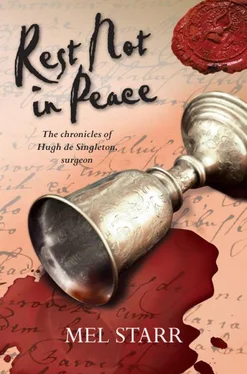Mel Starr - Rest Not in Peace
Здесь есть возможность читать онлайн «Mel Starr - Rest Not in Peace» весь текст электронной книги совершенно бесплатно (целиком полную версию без сокращений). В некоторых случаях можно слушать аудио, скачать через торрент в формате fb2 и присутствует краткое содержание. Год выпуска: 2013, Издательство: Lion Fiction, Жанр: Исторический детектив, на английском языке. Описание произведения, (предисловие) а так же отзывы посетителей доступны на портале библиотеки ЛибКат.
- Название:Rest Not in Peace
- Автор:
- Издательство:Lion Fiction
- Жанр:
- Год:2013
- ISBN:нет данных
- Рейтинг книги:4 / 5. Голосов: 1
-
Избранное:Добавить в избранное
- Отзывы:
-
Ваша оценка:
- 80
- 1
- 2
- 3
- 4
- 5
Rest Not in Peace: краткое содержание, описание и аннотация
Предлагаем к чтению аннотацию, описание, краткое содержание или предисловие (зависит от того, что написал сам автор книги «Rest Not in Peace»). Если вы не нашли необходимую информацию о книге — напишите в комментариях, мы постараемся отыскать её.
Rest Not in Peace — читать онлайн бесплатно полную книгу (весь текст) целиком
Ниже представлен текст книги, разбитый по страницам. Система сохранения места последней прочитанной страницы, позволяет с удобством читать онлайн бесплатно книгу «Rest Not in Peace», без необходимости каждый раз заново искать на чём Вы остановились. Поставьте закладку, и сможете в любой момент перейти на страницу, на которой закончили чтение.
Интервал:
Закладка:
“A possibility. You speak wisely. I must be discreet.”
“Or devious,” Kate said. “Cause a man to believe you suspect another, so he will lower his guard.”
“His guard, or hers?”
“You think a woman struck down Sir Henry? It could only be his wife or daughter… unless one of Lady Margery’s maids…”
“Aye, wife or daughter, and both have maids who wait upon them.”
“Why would Lady Margery want her husband dead?”
“Who can know if she did?”
“Or the daughter,” Kate added.
“If it is so that wife or daughter did this,” I said, “there will be also a man in the business.”
“A lover?”
“Aye. A wife who wishes to change husbands, or a daughter who wishes to wed a man to whom her father objects.”
Kate tore off another fragment from the maslin loaf and chewed it thoughtfully. “There must be other reasons men do murder.”
“I believe there are but three,” I said. “A man has what another man wants, and is slain for it. Or, a man has what another man wants, and murders the other to keep it. Or revenge… to requite some injury.”
“Which of these brought Sir Henry’s death, you think?”
“I cannot tell,” I said. “But when I learn the reason I will have the felon, I think.”
My cup of ale was not quite empty. I swallowed the dregs, kissed Kate and Bessie — who had been exploring her toes all the while her mother and I had tried to account for the evil men do to others — placed my cap upon my head, and set off from Galen House for the castle.
I was but a few steps from my door when I heard someone retching nearby. The sound came from behind my own house. I crept quietly alongside of Galen House ’til I could peer around the corner into the toft. Kate stood just outside the rear door, one hand upon her stomach, the other across her mouth. Her retching had ceased.
I remembered well the last time Kate was so afflicted and so walked with light heart to the castle. I was sure that Bessie would soon have a playmate.
CHAPTER 4
My joy was much reduced when I arrived at the castle, for there all was in mourning. Sir Henry’s coffin, shrouded in black linen, lay upon a bier just inside the gatehouse, and as I watched, Lady Margery and Lady Anne appeared, garbed in their most somber cotehardies, ready to assume their places behind the coffin as chief mourners when the procession to the church began.
Father Thomas de Bowlegh arrived a few moments later. As I watched him pass under the portcullis I saw behind him, through the opening, that a small knot of Bampton citizens was gathering in the forecourt.
The priest spoke a few words to Lady Margery, then nodded to the four grooms who stood ready at the poles to bear the coffin to St Beornwald’s Church. Father Thomas took his place at the head of the procession, ready to lead the way.
The grooms bent to their poles and followed Father Thomas through the gatehouse, Lady Margery and Lady Anne close behind. Lord Gilbert, Lady Petronilla, and Sir Roger walked behind the bereaved widow. Then came Sir John and Sir Geoffrey. I fell into the column with the squires William and Robert, as my rank ordained.
The bier was hardly out from under the gatehouse when Lady Margery set up a dreadful wail. Lady Anne joined in, but both were immediately overwhelmed by the small crowd which I had seen through the open gate and portcullis. Somehow Lady Margery had found funds to hire mourners for Sir Henry’s funeral, and these now offered a howl of grief so as to earn their pay.
The procession crossed Shill Brook on Mill Street, and thence traveled on Bridge Street to Church View. Kate watched from the door, Bessie wide-eyed, clutching at her mother’s cotehardie, as the procession passed Galen House. While I walked I tried to watch and see if any mourners before me seemed less enthusiastic in their grief than the others. This was difficult to do, observing the backs of heads. And behind me the Bampton citizens hired for the purpose set up a mind-numbing clamor which did not abate until the coffin was set down in the lychgate.
Father Thomas there began Sir Henry’s funeral, but I paid little heed to the dirge. Any man who has survived the plague and its return has heard such many times. I watched to see if any of Sir Henry’s mourners seemed complacent while others grieved, but either the felon was cunning, or I am unable to recognize guilt in a man’s features.
Father Thomas completed the office, then turned and strode toward the church porch. The grooms who bore Sir Henry’s corpse resumed their task, and we mourners followed, silent now, into St Beornwald’s Church. Father Thomas can be eloquent when the mood strikes, and after the funeral mass, it did. His oration was as fine as any duke might deserve. I hope Lady Margery appreciated his effort.
When he was done Father Thomas led us to the churchyard and near to the south transept scraped a furrow into the turf with a toe. The grave-diggers plied their spades at this place, and there was soon a pit large enough for Sir Henry to await the Lord Christ’s return.
The grooms lowered the black-veiled coffin into the grave and mourners who had brought with them sprigs of rosemary tossed the greenery atop the coffin. Father Thomas reminded all to remember to pray for Sir Henry, that his soul be released sooner from purgatory. It may be difficult for a wealthy man to enter heaven, but it is also sure that it is hard for a poor man to escape purgatory. If Sir Henry had not lived a life worthy of heaven I doubt that my prayers, or any man’s, would send him there. But I keep such heretical views to myself. I am responsible for the care of a wife and a child. Perhaps soon two children. It would not do to provoke the bishops.
Sir Roger approached and drew me from the grave and those who surrounded it as earth was shoveled atop the coffin. We were near the churchyard wall when he turned and drew from his pouch a scrap of parchment the size of my palm. “This,” he said softly, “was slipped under my door in the night, whilst I slept.”
A few lines, hastily scrawled, filled one side of the fragment. The letters were so badly formed that at first I could not decide whether the words were Latin or English. A moment of scrutiny told me that before me was a message in English, written by some man unfamiliar with a pen.
“The squire has what you seek,” was lettered in a crude hand upon the parchment.
“Who has written this,” the sheriff asked, “and what is it that I seek?”
“You are here to seek a murderer, are you not?”
“Aye. Does this then say that one of Sir Henry’s squires did murder, or does a squire know who is guilty?”
“Perhaps both. If one of the squires is the guilty man, the other may know of it. But why, I wonder, tell you in this manner? Why not speak of the knowledge directly to you?”
“Aye, why not? The man who wrote this wishes to be unknown.”
“Some knight or valet or groom knows, or believes he knows, who has slain Sir Henry,” I said, “but wants to conceal from you that he possesses such information.”
“Which squire?”
“Perhaps the man does not know. Or perhaps the squires worked together to strike down Sir Henry.”
“Then what is it we seek?” Sir Roger asked.
“Evidence. When we have returned to the castle I will tell Lord Gilbert that while others are at dinner in the hall we will inspect the chamber where Sir Henry’s squires sleep.”
“You believe what the squire has is a thing, rather than information?”
“Who can say? If some evidence is to be found in the squires’ chamber, it may be more readily discovered than knowledge, which men may more easily obscure from the view of others.”
Читать дальшеИнтервал:
Закладка:
Похожие книги на «Rest Not in Peace»
Представляем Вашему вниманию похожие книги на «Rest Not in Peace» списком для выбора. Мы отобрали схожую по названию и смыслу литературу в надежде предоставить читателям больше вариантов отыскать новые, интересные, ещё непрочитанные произведения.
Обсуждение, отзывы о книге «Rest Not in Peace» и просто собственные мнения читателей. Оставьте ваши комментарии, напишите, что Вы думаете о произведении, его смысле или главных героях. Укажите что конкретно понравилось, а что нет, и почему Вы так считаете.












